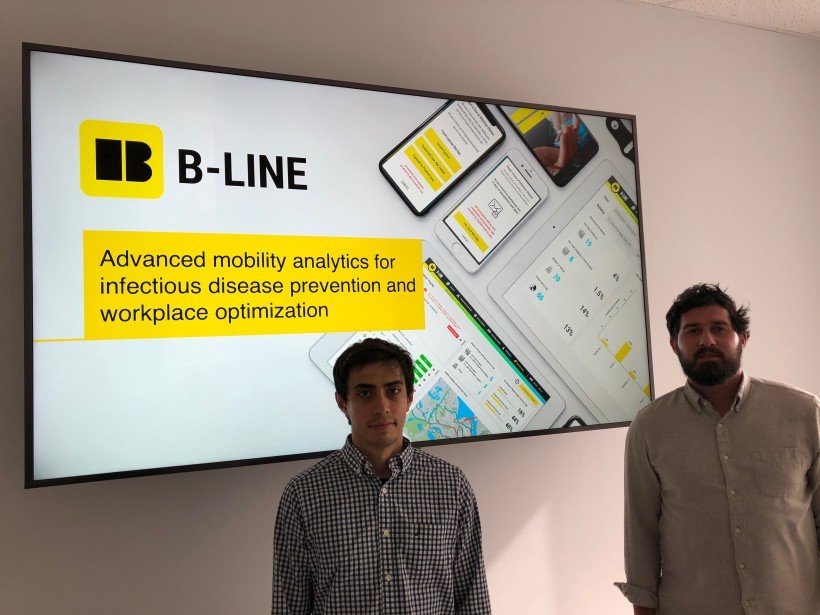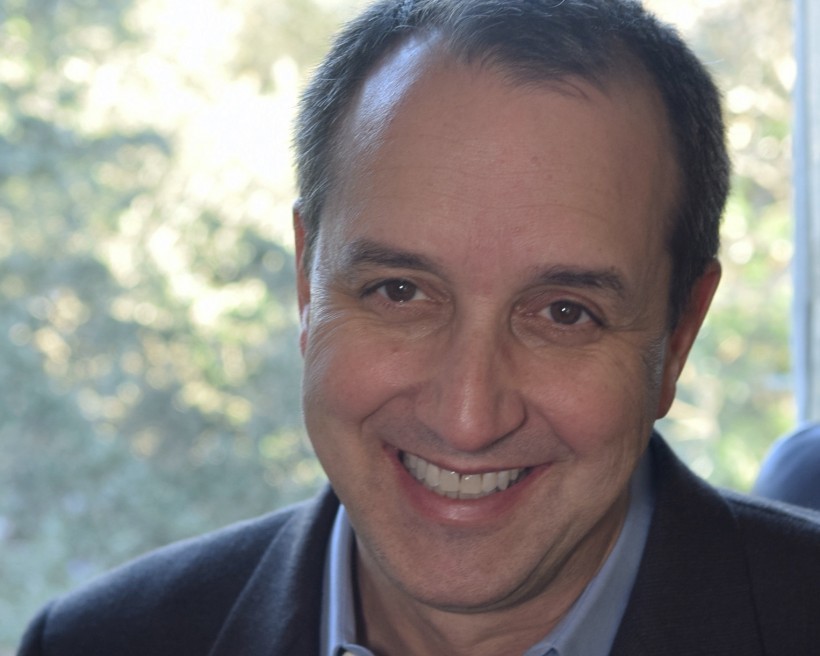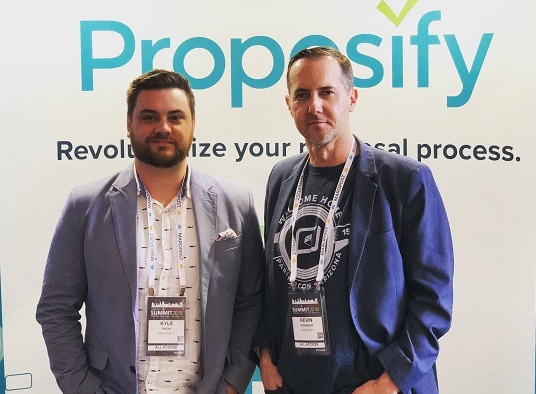New creative solutions and successful funding rounds
July 15, 2020
By Carol Moreira
June brought new innovations and successful funding rounds for startups and scaleups in the District.
B-Line Analytics,a Halifax startup that makes software that tracks commuters, is creating a contact-tracing service to alert users if they come in contact with someone with COVID-19.
The venture’s existing app tracks users’ movements to and from commercial buildings so that planners can understand and manage traffic flows.
Now B-Line is adding features to identify where people with COVID-19 have been. B-Line’s offering is limited to a single office building at a time.
“People are on high alert right now, and anything [that makes] them feel safer, people want that solution,” CEO Aaron Short told Entrevestor. “Otherwise, it’s like getting on a ship with no life jackets.”
The app will allow infected users to share information, such as which floor of a building they work on and the times they were there. Other users are told of possible exposure.
The whole process is anonymous. It’s also voluntary and localized; Short said it won’t need legislative changes other forms of tracking might require.

Halifax-based b4, which offers Software-as-a-Service products for the hospitality industry, launched a contactless payments process to help hotels recover from the pandemic.
Physical distancing and hygiene regulations make processing credit cards problematic. The venture’s answer is TransForm, a contactless process that allows hotels to accept payments online as eCommerce transactions.
The system integrates into a property’s payment gateway and needs no manual keying of credit card data, leaving the hotel safer from fraud and various fees, the company said.
The Nova Scotia Health Authority and Dalhousie University are leading projects that received investments worth $1.1 million from the Canadian Institutes of Health Research (CIHR) and Research Nova Scotia. The contributions are part of a Rapid Research Funding Opportunity relating to COVID-19 announced in May, DalNews reported.
The partners in the funding opportunity are the CIHR, the International Development Research Centre, the Michael Smith Foundation for Health Research, Alberta Innovates, the Saskatchewan Health Research Foundation, Research Manitoba, the New Brunswick Health Research Foundation, and Research Nova Scotia.
The projects are supporting clinical trials and other approaches to boost projects with potential, adapt current research, and initiate fresh research into COVID-19.
Food safety startup Foodbyte reported that its revenue has increased about 33 per cent since the pandemic began.
The venture sells software that tracks regulation-compliance for food producers. World Health Organization guidelines were becoming increasingly stringent even before the pandemic, the company said.
“If you think back to the approach post-9/11 that much of the world took to the aviation industry, that’s the type of magnitude we’re talking about, where there’s this incredible change in a very short period of time,” CEO Sean Pindar told Entrevestor.

The company recently received $50,000 of investment from Innovacorp and the New Brunswick Innovation Foundation, upon graduation from Propel's Incite II program.
Online fitness venture, Bloxo Inc. won the Massachusetts Institute of Technology’s 2020 Startup Spotlight pitch competition.
After pivoting because of the pandemic, Bloxo now allows users to register for and join online fitness activities. Bloxo’s founders are considering a funding round, depending on the success of their virtual product.

Ocean Startup Challenge Launched
A contest that asks participants to compete to solve problems faced by oceans companies has been launched by the Ocean Startup Project (the first Innovation Ecosystem Project announced by Canada’s Ocean Supercluster.)
The Ocean Startup Challenge will offer contestants the chance to compete for ten $25,000 prizes. Organizer the Ocean Startup Project is mandated to double the number of high-quality oceantech startups in the region.
Winners will share access to $18,000 of in-kind services from sponsors and might also compete for additional prizes of $100,000.
Initially, competitors will participate in online bootcamps. The bootcamps will help entrepreneurs develop their skills and offer networking opportunities with industry professionals. Staff will also help match founders with regional incubators and accelerators.
Competitors will be judged by industry experts. Entrepreneurs can apply from anywhere but winners will need to register as businesses in Atlantic Canada.
Cannabis Assessment Without Lab
Greenlight Analytical, a cannabis testing company, is planning to launch a device that assesses the quality of cannabis crops without the need for expensive lab testing.
The product will be a modified mass spectrometer and artificial intelligence system that will translate the spectrometer’s output into an easily understandable format.
“The user puts a bud in, closes the door, presses a green button, and that’s it,” CEO James Wylde told Entrevestor. He said the solution is much simpler and swifter than existing options for assessing cannabis.
Greenlight hopes to get its device to market within six months as long as it completes a $750,000 funding round. The team will initially focus on licensed Canadian cannabis growers, and then expand into the U.S.
Raising Funds to Better Assist Non-Profits
Artificial intelligence startup Invisible Agents is working on raising $500,000 to help non-profits and churches raise funds.
The company – which moved from Texas to Halifax through the federal government’s Startup Visa program – offers machine learning-based ideas about how best to customize and target fundraising.
“There’s a broader acceptance in the for-profit space of the inherent value of having more data analytics, but the non-profits don’t often have that luxury, because they need a tangible, monetary ROI (return on investment),” Founder Stuart Boyd told Entrevestor.

Boyd will begin a research project with a Dalhousie University professor and graduate students, assisted by MITACS, the national group that links researchers and corporations.
Boyd lauded the support he’s received locally, especially from Innovacorp and Nova Scotia Business Inc.
“Starting a business, cash is key, especially with bootstrapping,” he said. “And with the wide array of programs, it felt like Nova Scotia and Atlantic Canada had a hierarchy of offerings that I didn’t find elsewhere in Canada.”
Some Find Success
Adaptiiv Medical Technologies won the Nova Scotia Health Authority’s first Health Challenge pitch competition, leaving with a prize of $100,000.
Hosted by Halifax innovation hub Volta, the Health Challenge identifies technologies that can modernize the province’s healthcare system. The recent contest focused on cancer-related ideas. The NSHA will consider adopting Adaptiiv’s technology.
Adaptiiv sells equipment and software for 3D printing specialized bolus devices – pieces of polymer placed on patients’ bodies to target radiation therapy during cancer treatment.
The company has sales in 14 countries and regulatory clearance in all major markets. The venture recently completed a $3.4 million funding round, more than doubling its $1.5 million target.
With its annual recurring revenue reaching $8 million, Proposify closed a funding round led by Toronto-based Canadian Business Growth Fund, CBGF.
The size of the round wasn’t revealed, but it was the first time CBGF invested in an Atlantic Canadian company. The $545 million CBGF fund is backed by big Canadian banks and insurers. Innovacorp, the Nova Scotia early-stage venture capital fund, participated in the round as a returning investor.
Proposify’s software simplifies and improves the process of writing proposals in the cloud. The company last raised capital in early 2018. It has over 10,000 customers in 35 different countries, and sales are rebounding following the pandemic.

“We have found Halifax to be a great entrepreneurial hub, and we look forward to exploring further investment opportunities in the region,” said CBGF Chief Executive George Rossolatos.